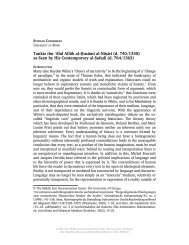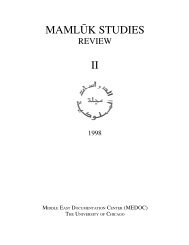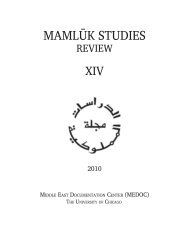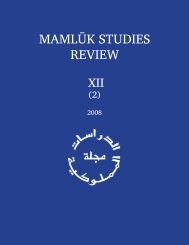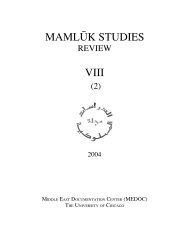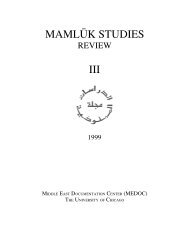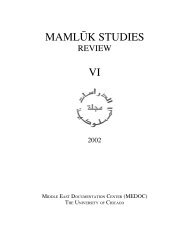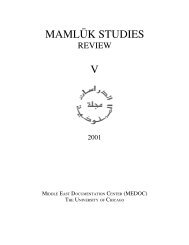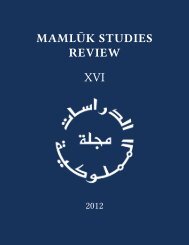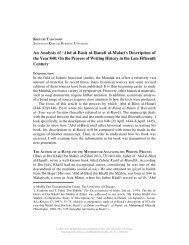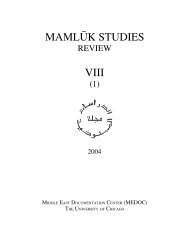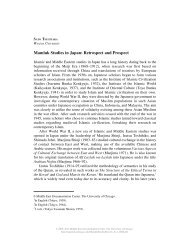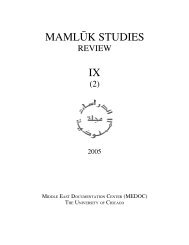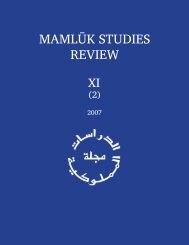Mamluk Studies Review Vol. IV (2000)
Mamluk Studies Review Vol. IV (2000)
Mamluk Studies Review Vol. IV (2000)
Create successful ePaper yourself
Turn your PDF publications into a flip-book with our unique Google optimized e-Paper software.
28 ROBERT IRWIN, UNDER WESTERN EYES<br />
Constantin-Francois de Chassebouef, comte de <strong>Vol</strong>ney (1757-1820), took a<br />
similarly bleak view of the <strong>Mamluk</strong> system as he knew it in his own time: "how<br />
numerous must be the abuses of unlimited powers in the great, who are strangers<br />
both to forbearance and to pity, in upstarts proud of authority and eager to profit<br />
by it, and in subalterns continually aiming at greater power." 3 <strong>Vol</strong>ney's writings,<br />
his Voyage en Égypte et en Syrie (1787) and his Les Ruines, ou méditations sur<br />
les révolutions (1791), helped to direct predatory French interests in the direction<br />
of Egypt and are part of the background to Bonaparte's expedition there in 1798.<br />
Famously (or notoriously, if one happens to be of Edward Said's party) Bonaparte<br />
took a team of savants with him. Of course, the past which most attracted these<br />
scholars was the Pharaonic one. However, a few interested themselves in the<br />
history of the medieval <strong>Mamluk</strong>s, if only for latter-day utilitarian reasons. Jean-<br />
Michel Venture de Paradis had helped <strong>Vol</strong>ney with his Voyage en Égypte et Syrie.<br />
Having come across a manuscript of Khal|l al-Z˛a≠hir|'s Zubdat Kashf al-Mama≠lik<br />
in Paris, he went on to produce a stylish, if erratic, translation of it. Venture de<br />
Paradis studied the Egypt of Barsba≠y and Jaqmaq, the better to understand the<br />
same country under Mura≠d and Ibra≠h|m Bey, and he subsequently took part in the<br />
1798 expedition to Egypt and took a leading role in the researches of the Institut<br />
d'Égypte. 4<br />
The French who landed in Egypt in 1798 and who went on to invade Palestine<br />
were intensely conscious of the fact that Frenchmen had been there before them.<br />
The history of the <strong>Mamluk</strong>s was for a long time ancillary to the study of the<br />
Crusades and of the fortunes of France in the Levant. In the eighteenth century,<br />
religious scholars belonging to the Maurist order had played the leading role in<br />
editing documents relating to the history of France and therefore also relating to<br />
the history of French Crusades. In the course of the French Revolution, the Maurist<br />
Superior-General was guillotined and the order was dissolved. When monarchy<br />
was restored the Académie des Inscriptions et des Belles-Lettres was set up to<br />
continue the work of the Maurists. Quatremère and Reinaud, who had oriental<br />
interests, were both members of the founding committee of five. They, among<br />
other tasks, oversaw the publication of the Recueil des historiens des croisades,<br />
which, in its volumes devoted to Historiens orientaux, 5 offered translated extracts<br />
from chronicles by Abu≠ al-Fidá and Abu≠ Sha≠mah covering the early years of the<br />
3<br />
<strong>Vol</strong>ney cited in Albert Hourani, Europe and the Middle East (London, 1980), 85-86.<br />
4<br />
Jean Gaulmier, ed., La Zubda Kachf al-Mama≠lik de Khal|l az-Za≠hir|, Traduction inédite de<br />
Venture de Paradis (Beirut, 1950).<br />
5<br />
Paris, 1872-1906.<br />
© <strong>2000</strong>, 2012 Middle East Documentation Center, The University of Chicago.<br />
http://mamluk.uchicago.edu/<strong>Mamluk</strong><strong>Studies</strong><strong>Review</strong>_<strong>IV</strong>_<strong>2000</strong>.pdf



